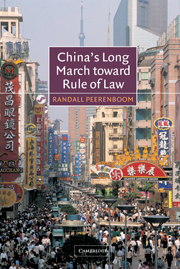Book contents
- Frontmatter
- Contents
- Preface
- List of abbreviations
- 1 Introduction
- 2 The evolution of rule of law in China: the role of law in historical context
- 3 Post-Mao reforms: competing conceptions of rule of law
- 4 Rule of law and its critics
- 5 Retreat of the Party and the state
- 6 The legislative system: battling chaos
- 7 The judiciary: in search of independence, authority, and competence
- 8 The legal profession: the quest for independence and professionalism
- 9 The administrative law regime: reining in an unruly bureaucracy
- 10 Rule of law and economic development
- 11 Rule of law, democracy, and human rights
- 12 Conclusion: the future of legal reform
- References
- Index
1 - Introduction
Published online by Cambridge University Press: 20 July 2009
- Frontmatter
- Contents
- Preface
- List of abbreviations
- 1 Introduction
- 2 The evolution of rule of law in China: the role of law in historical context
- 3 Post-Mao reforms: competing conceptions of rule of law
- 4 Rule of law and its critics
- 5 Retreat of the Party and the state
- 6 The legislative system: battling chaos
- 7 The judiciary: in search of independence, authority, and competence
- 8 The legal profession: the quest for independence and professionalism
- 9 The administrative law regime: reining in an unruly bureaucracy
- 10 Rule of law and economic development
- 11 Rule of law, democracy, and human rights
- 12 Conclusion: the future of legal reform
- References
- Index
Summary
The hallmarks of modernity are a market economy, democracy, human rights, and rule of law. Not surprisingly, China first began to grapple with the need to reform the legal system in earnest during the Qing dynasty as part of its attempt to come to grips with modernity. Although those early reforms could not gain a foothold in the chaotic civil war conditions of the Republican era, and law subsequently took a back seat to politics during much of the Mao period, legal reforms and rule of law again became a hot issue when China emerged from the Cultural Revolution in the late 1970s and Deng Xiaoping announced his ambitious platform to modernize China. Twenty years of economic and legal reforms have only served to raise the temperature.
Nowadays, it is virtually impossible to open any Chinese newspaper without seeing reference to rule of law. Signs painted on buildings in the countryside proclaim the need to act in accordance with law. Flyers posted in cities urge passersby to steadfastly uphold the law. Scholars have produced literally hundreds of books and articles on the topic in the last ten years. And in 1999, the Constitution was amended to expressly provide for the establishment of a socialist rule-of-law state.
On the other hand, the initial reaction of many members of the general public to any attempt to link rule of law to China is one of shock and amusement. The less informed genuinely if bemusedly still question whether China even has laws.
- Type
- Chapter
- Information
- China's Long March toward Rule of Law , pp. 1 - 26Publisher: Cambridge University PressPrint publication year: 2002



